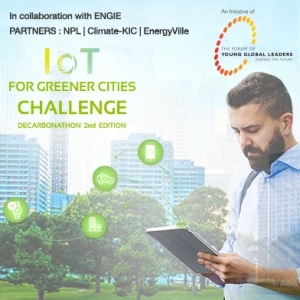Jun 6 2017
Four innovative projects have been declared the winners of the Internet of Things for Greener Cities Challenge: a competition created through a Young Global Leaders initiative of the World Economic Forum to find the most promising solutions to reduce CO2 emissions in cities.
 Credit: NPL
Credit: NPL
The IoT challenge looks to find and develop cutting-edge technologies, based on the Internet of Things (IoT) and other IT innovations, which could be easily introduced in our homes, buildings and cities to reduce CO2 emissions and improve local air quality. The competition was supported by ENGIE, the Centre for Carbon Measurement at the National Physical Laboratory (NPL), Climate-KIC and EnergyVille.
Nearly 300 teams entered this worldwide competition around three categories: Households; Building; and Mobility. From these, 15 finalists were invited to a two-day hackathon at the ENGIE headquarters in Brussels, where technical experts were on hand to hone the projects.
Each team pitched to a jury of experts, who evaluated each project in terms of environmental impact, barriers to entry, potential market and innovation.
The winners are:
- Households: BrighTap
- A smart water meter and analyser for tracking users' water usage
- Buildings: Optifuse
- IoT solution for fuse boxes and consumer units to monitor and control the loads remotely, analyse energy usage and take action to save energy and cost, as well as helping to counter electrical disturbances and outages
- Mobility: WeNow
- A data-driven technology to help vehicle operators to drive energy-efficiently and reduce their climate impact to zero through reducing and offsetting the car's carbon emissions
- Jury Prize: Luko
- A single low-cost device to make standard household meters smart combined with advanced machine learning that helps users to reduce their electric bills and environmental footprints
Each finalist team received significant visibility of their project and the four winners will be supported by technical experts to help develop their ideas and prototypes over the next six months. In addition, each winner will be pitching their products at the Viva Technology show in June, as well as receiving a number of IoT environmental gadgets.
The jury was made up of policy, energy and climate experts, including:
- Alexander De Croo: Deputy Prime Minister and Minister of Development Cooperation, Digital Agenda, Telecommunications and Postal Services of Belgium
- Benoist Vercherin: Entrepreneurship & Innovation Lead, Climate-KIC France
- Jane Burston: Head of Climate and Environment, National Physical Laboratory
- John Dutton: Director of the World Economic Forum and Head of the Forum of Young Global Leaders
- Koenraad Debackere: Scientific Council President of ENGIE, General Manager of KU Leuven and Managing Director of KU Leuven R&D
- Raphaël Schoentgen: CTO, ENGIE and President of Hydrogen Europe
- Ronnie Belmans: CEO EnergyVille and Professor at KU Leuven
The competition follows the success of the first Decarbonathon competition that saw 230 teams from all over the world compete in the wake of the Paris climate change negotiations, COP21, to find promising new ways of reducing CO2 emissions. The winners received significant support to help scale up their innovation.
IoT for Greener Cities Challenge - Day #2